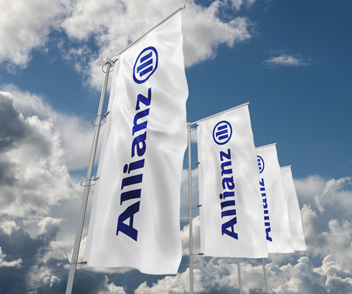- The biggest threats to Nigeria are market volatility and corruption.
- Political risks and violence is still a major challenge largely due to terrorism and kidnap for ransom.
- Cyber risk concerns rank fifth in Nigeria driven by impact of indirect attacks, regulatory threats and technical and employee error in digitalized production environment
- Globally, Business interruption (BI) continues to lead the ranking for the fifth year in a row. This risk is ranked 8th in Nigeria.
Companies operating in Africa increasingly worry about the unpredictable business environment where markets are volatile (#1) and political perils, such as protectionism or terrorism are on the rise. Other growing concerns are digital dilemmas arising from new technologies and cyber risks (#6), as well as natural catastrophes (#7). These are the key findings of the 6th annual Allianz Risk Barometer analyzing corporate risks globally, as well as by region, country, industry and size of business.
In order to anticipate any sudden changes of rules that could impact markets, companies will need to invest more resources into better monitoring politics and policy-making around the world in 2017. According to trade credit insurer, Euler Hermes, a subsidiary of Allianz SE, since 2014, there have been 600 to 700 new trade barriers introduced globally every year.
“Most African countries such as South Africa and Nigeria face macroeconomic challenges including low commodity prices, the Chinese slowdown and the tightening of US monetary policy and also suffer their own internal pressures such as inflation, weak domestic demand and socio-political tensions,” says Delphine Maïdou, CEO of AGCS Africa.
While conventional terrorism is a real concern, the growing risk of political violence events such as war, civil war, insurrection and other politically motivated incidents which focus on countries – particularly in Middle East and Africa – rather than certain locations should not be underestimated, according to Christof Bentele, Head of Global Crisis Management, AGCS. “The impact for globally operating businesses and our customers can be much greater and longer-lasting,” he says.
“Instability in African states such as Burundi, The Gambia, Democratic Republic of Congo, Libya, Somalia and South Sudan is a chief concern as well as the persistent Islamic terrorism of Boko Haram in some parts of Nigeria,” adds Bentele.
In order to anticipate any sudden changes of rules that could impact markets, companies will need to invest more resources into better monitoring politics and policy-making around the world in 2017. According to trade credit insurer, Euler Hermes, a subsidiary of Allianz SE, since 2014, there have been 600 to 700 new trade barriers introduced globally every year.
“Most African countries such as South Africa and Nigeria face macroeconomic challenges including low commodity prices, the Chinese slowdown and the tightening of US monetary policy and also suffer their own internal pressures such as inflation, weak domestic demand and socio-political tensions,” says Delphine Maïdou, CEO of AGCS Africa.
While conventional terrorism is a real concern, the growing risk of political violence events such as war, civil war, insurrection and other politically motivated incidents which focus on countries – particularly in Middle East and Africa – rather than certain locations should not be underestimated, according to Christof Bentele, Head of Global Crisis Management, AGCS. “The impact for globally operating businesses and our customers can be much greater and longer-lasting,” he says.
“Instability in African states such as Burundi, The Gambia, Democratic Republic of Congo, Libya, Somalia and South Sudan is a chief concern as well as the persistent Islamic terrorism of Boko Haram in some parts of Nigeria,” adds Bentele.

Globally, business interruption (BI) continues to lead the ranking for the fifth year in a row (37% of responses), primarily because it can lead to significant income losses, but also because multiple new triggers are emerging, especially non-physical damage or intangible perils, such as cyber incidents, and disruption caused by political violence, strikes and terror attacks. This trend is driven, in part, by the rise of the “Internet of Things” (IoT) and the ever-greater interconnectivity of machines, companies and their supply chains which can easily multiply losses in case of an incident. Companies are also facing potential financial losses with the changing political landscape leading to fears of increasing protectionism and anti-globalization.
“Companies worldwide are bracing for a year of uncertainty,” says Chris Fischer Hirs, CEO of Allianz Global Corporate & Specialty (AGCS) SE. “Unpredictable changes in the legal, geopolitical and market environment around the world are constant items on the agenda of risk managers and the C-suite. A range of new risks are emerging beyond the perennial perils of fire and natural catastrophes which require re-thinking of current monitoring and risk management tools.”
At the same time, increasing reliance on technology and automation is transforming, and disrupting, companies across all industry sectors. While digitalization is bringing companies new opportunities, it is also shifting the nature of corporate assets from mostly physical to increasingly intangible, bearing new hazards, above all cyber risks (30% of responses). Companies ranked cyber threats a close #3 globally, climbing to #2 across the Americas and Europe and the top risk in Germany, the Netherlands, South Africa and the UK. At the same time, it is the top concern globally for businesses in the information and telecommunications technology and the retail/wholesale sectors.
“Cyber incidents is ranked #5 in Africa with the most common threats being from hackers, disgruntled employees, negligence and competitors,” says Nobuhle Nkosi Head of Financial Lines AGCS Africa. “This is doubled-edged sword to the continent as Africa has a particular role in embracing and responding to new technologies compared to mature markets while speeding up cyber security and personal data protection legislations.”
The threat now goes far beyond hacking and privacy and data breaches, although new data protection regulations will exacerbate the fall-out from these for businesses. Time is running out for businesses to prepare for the implementation of the new General Data Protection Regulation across Europe in 2018 – although the cost of compliance will be high, the penalties of not doing so could be even higher. Meanwhile, increasing interconnectivity and sophistication of cyber-attacks poses not only a huge direct risk for companies but also indirectly via exposed critical infrastructures such as IT, water or power supply. Then there is the threat posed by technical failure or human error, which can lead to long-lasting and widespread BI exposures. In the digitalized production or Industry 4.0 environment, a failure to submit or interpret data correctly could stop production. Businesses need to think about data as an asset and what prevents it from being used. Results also show that smaller companies may be underestimating cyber risk: in this category (revenues <€250 million), cyber ranks only #6. However, the impact of a serious incident could be much more damaging for such firms.
“Companies worldwide are bracing for a year of uncertainty,” says Chris Fischer Hirs, CEO of Allianz Global Corporate & Specialty (AGCS) SE. “Unpredictable changes in the legal, geopolitical and market environment around the world are constant items on the agenda of risk managers and the C-suite. A range of new risks are emerging beyond the perennial perils of fire and natural catastrophes which require re-thinking of current monitoring and risk management tools.”
At the same time, increasing reliance on technology and automation is transforming, and disrupting, companies across all industry sectors. While digitalization is bringing companies new opportunities, it is also shifting the nature of corporate assets from mostly physical to increasingly intangible, bearing new hazards, above all cyber risks (30% of responses). Companies ranked cyber threats a close #3 globally, climbing to #2 across the Americas and Europe and the top risk in Germany, the Netherlands, South Africa and the UK. At the same time, it is the top concern globally for businesses in the information and telecommunications technology and the retail/wholesale sectors.
“Cyber incidents is ranked #5 in Africa with the most common threats being from hackers, disgruntled employees, negligence and competitors,” says Nobuhle Nkosi Head of Financial Lines AGCS Africa. “This is doubled-edged sword to the continent as Africa has a particular role in embracing and responding to new technologies compared to mature markets while speeding up cyber security and personal data protection legislations.”
The threat now goes far beyond hacking and privacy and data breaches, although new data protection regulations will exacerbate the fall-out from these for businesses. Time is running out for businesses to prepare for the implementation of the new General Data Protection Regulation across Europe in 2018 – although the cost of compliance will be high, the penalties of not doing so could be even higher. Meanwhile, increasing interconnectivity and sophistication of cyber-attacks poses not only a huge direct risk for companies but also indirectly via exposed critical infrastructures such as IT, water or power supply. Then there is the threat posed by technical failure or human error, which can lead to long-lasting and widespread BI exposures. In the digitalized production or Industry 4.0 environment, a failure to submit or interpret data correctly could stop production. Businesses need to think about data as an asset and what prevents it from being used. Results also show that smaller companies may be underestimating cyber risk: in this category (revenues <€250 million), cyber ranks only #6. However, the impact of a serious incident could be much more damaging for such firms.
Press Contacts
About Allianz Global Corporate & Specialty
Allianz Global Corporate & Specialty (AGCS) is the Allianz Group's dedicated carrier for corporate and specialty insurance business. AGCS provides insurance and risk consultancy across the whole spectrum of specialty, alternative risk transfer and corporate business: Marine, Aviation (incl. Space), Energy, Engineering, Entertainment, Financial Lines (incl. D&O), Liability, Mid-Corporate and Property insurance (incl. International Insurance Programs).
Worldwide, AGCS operates with its own teams in 34 countries and through the Allianz Group network and partners in over 210 countries and territories, employing almost 4,700 people of 70 nationalities. AGCS provides insurance solutions to more than three quarters of the Fortune Global 500 companies, writing a total of €7.4 billion gross premium worldwide in 2017.
AGCS SE is rated AA by Standard & Poor’s and A+ by A.M. Best.
Worldwide, AGCS operates with its own teams in 34 countries and through the Allianz Group network and partners in over 210 countries and territories, employing almost 4,700 people of 70 nationalities. AGCS provides insurance solutions to more than three quarters of the Fortune Global 500 companies, writing a total of €7.4 billion gross premium worldwide in 2017.
AGCS SE is rated AA by Standard & Poor’s and A+ by A.M. Best.
Forward Looking Statement disclaimer
As with all content published on this site, these statements are subject to our Forward Looking Statement disclaimer:
Newsletter
Keep up to date on all news and insights from Allianz Commercial

















